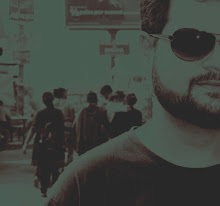“For God's sake hold your tongue, and
let me love,
Or chide my palsy, or my gout,
My five gray hairs, or ruined
fortune flout,
With wealth your state, your
mind with arts improve”
 |
| Priyanshu and Dia in Paanch Adhyay |
Divided into five
chapters, each named after a Tagore song,
Sedin dujone, Ogo bideshini, Amar e path, Amar raat pohalo and Tomay
notun kore pabo bole, the film has traces of Tagoreana pervading throughout
the film. Arindam even goes on to make Charukatha,
his take on Charulata. The film
excels in its leit-motif of literary angles. It opens with the beautiful
words from Eternal Sunshine of the Spotless
Mind: “Clementine: This is it, Joel. It's going to be gone soon. Joel: I know. Clementine: What do we do? Joel: Enjoy
it”, and the director opens up a world of a Clementine and Joel, who try hard
to erase and evade their predicament, but end up enjoying the little moment of
togetherness, that has been allotted to them. One of the finest citations has
been that of the Black Swan. As Ranjabati (Sampurna), falters in her first shot, as
she fails to portray her passion for her lover in the new version of Charukatha with her Black Swan make-up, Arindam, her
director emerges as Thomas Leroy, albeit in a new avatar, to arouse the beloved
in her. Ishita reading Virginia Woolf’s Mrs. Dalloway and Arindam buying a copy
of the same in the final frame of the film, subliminally touches upon the crux
of the entire story. The short glimpse of the poster of the film Sweet Rush, the idea of Beauty and Truth from Robert Frost's The Rose Family and Priyanshu’s Arindam named
after one of the best screen names of Uttam Kumar in Satyajit Ray’s Nayak speak of the director’s
penchant for ‘intertextuality’, notwithstanding his long career as a renowned
film critic. Paanch Adhyay excels in creating a poem through the references and the adept
use of symbolism.
Gupta
proves that a film can thrive only with its content, and its technical aspects.
Moreover, I don’t remember a single film in the recent past that has only two
major characters pulling off the entire film only through their nuanced
performances. Priyanshu Chatterjee and Dia Mirza could not have asked for
meatier and meaningful roles. A film does not need big names to attract
audience and the director uses his available resources at his best in this
Kaustuv Roy production. Priyanshu captures Arindam’s dilemma, his pains and his
angst in his beautiful eyes. Dia Mirza delivers her best performance. The moment
Ishita reveals her secret to Arindam is perhaps one of the finest performances
of Mirza, elegant and graceful, effortless yet ethereal. Her Bengali diction is
way better than many of her Bollywood counterparts.
Apart
from the sensitive story (Pratim D. Gupta) aided by heart-wrenching
performances, Paanch
Adhyay needs to be praised
for its music and its magical cinematography. Santanu Moitra’s harmony reaches
its apotheosis in Subha Mudgal and Swanand Kirkire’s renditions of Ure Jay and Uda Jaye placed strategically in the second and the third chapters
of the film, capturing the glorified solitude and loneliness of Arindam and
Ishita. Agantuk and Baavri are equally
impressive. Ananda Chakroborty, the DOP of the film, weaves a magical saga through
his sepia tones and aesthetic use of gray shades keeping the ‘tension’ taut.
Bengalees can’t do
without either Tagore or Satyajit Ray, and audience today, can’t take the ‘tension’
for too long. Such comments from Hrishi da (Soumitro Chatterjee in a cameo) echo the sources of inspiration for Gupta’s debut. Paanch Adhyay
definitely meanders around a ‘Tagoreana and a Ray gharana that is so deep rooted that one cannot ignore the traces; and the 113 minutes of the film is an
ode to Arghakamal Mitra’s editing skills.
A stranger, an agantuk becomes a dosar for a life time. Yet it takes a lifetime to know the person
on whom you “had once built an absolute trust”, bringing home the reality that even
a lifetime is not enough. Seize the day, enjoy every moment of togetherness, no
matter what trials you have to go through. Paanch
Adhyay is a tragic tale of an urban relationship with an uncanny turn of
fate that makes you count every moment of your life. It makes you want to shout
to the world Dohai toder ektuku chup kor,
Bhalobasibare amare de obosor.

No comments:
Post a Comment